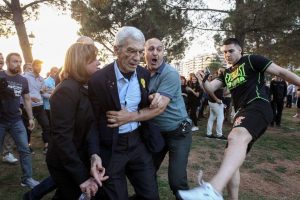Amanda Erickson THE WASHINGTON POST

Yiannis Boutaris is no stranger to controversy.
The 75-year-old Thessaloniki mayor is one of Greece’s most outspoken advocates for multiculturalism and international understanding. He has pushed for the construction of an Islamic mosque in the city, along with monuments honoring Turkish leaders such as Ataturk. He persuaded Turkish Airlines to begin flying directly from Istanbul to Thessaloniki, resulting in a huge surge in tourists.
He is the force behind the city’s new Holocaust museum, a “beacon against racism and fascism,” he said earlier this month in Berlin. He has offered up LGBTQ-friendly policies and criticized the Greeks who want Macedonia to change its name. Proponents of the name change say Macedonia is appropriating Greek culture and heritage. “History cannot be stolen,” he said in a January interview.
The European Commission has praised Boutaris as a “beacon” who has crafted an “island of hope” and “model for all of Greece.”
Boutaris’s politics have made him a frequent target of Greece’s growing far-right. The website of the pro-fascist Golden Dawn has accused the mayor of stoking “popular rage” and suggested that he is in Turkey’s pocket. The group accused him of being a traitor to his country because of his position on Macedonia. At a far-right rally earlier this year, leaflets calling Boutaris “a slave of the Jews” were scattered around the city.
Now, far-right activists have taken it a step further.
On Saturday, Boutaris was attacked by about a dozen far-right protesters, who kicked him in the head and legs and beat him with bottles. Eventually, the mayor’s aides stepped in, ferrying the leader away from his attackers. He was taken to a hospital and kept overnight for treatment.
The mayor was participating in a flag-lowering ceremony to honor those killed in the Pontic Genocide, a World War I-era attack on ethnic Greeks living in Anatolia. Ottoman Turks slaughtered hundreds of thousands and destroyed their churches.
“There were several people that attacked me. They were hitting me everywhere,” Boutaris told the Greek Reporter website. “It was a nightmare.”
Far-right violence is a growing problem in Greece. It “is definitely on the rise,” Seraphim Seferiades, a politics professor at Panteion University in Athens told Al Jazeera. “It’s something to be expected because there is a political gap [that the far right] is exploiting, and in that context, it’s likely we’ll see more violence.” In 2017, the number of hate crimes more than doubled, jumping to 184 from 84 the year before.
In January, a far-right group called Crypteia left death threats at several civil society groups, including the Muslim Association of Athens. In April, a group of 200 far-right assailants hurled bottles, stones and molotov cocktails at a group of refugees in Lesbos, chanting, “Burn them alive.” Earlier this month, several headstones in a Jewish cemetery were defaced.
On Sunday, even as most political leaders quickly condemned the assault, far-right lawmakers tweeted their support for the attackers. The mayor of Mycenae-Argos, a member of the center-right opposition party, tweeted about the attack: “This is the fate of the TRAITORS.”
So far, police have arrested two suspects in conjunction with the attack. One, a 20-year-old, confessed and said he did it because Boutaris has said he favors closer relations to Turkey.
[Battered for a decade, Greece feels an unexpected whiff of revival as Europe gains strength]





